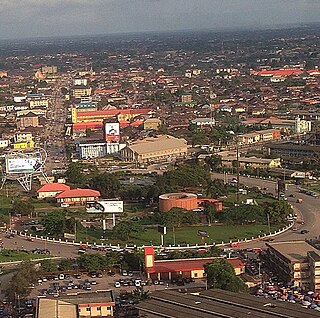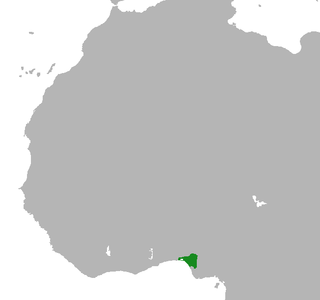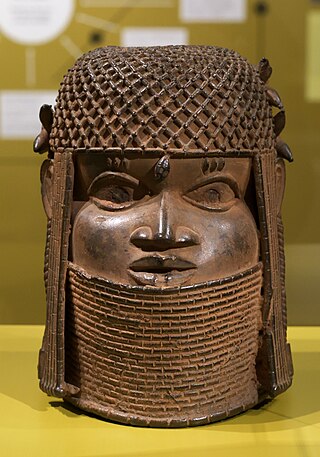Related Research Articles

Benin City serves as the capital and largest metropolitan centre of Edo State, situated in southern Nigeria. Notably, it ranks as the fourth-most populous city in Nigeria, according to the 2006 national census, preceded only by Lagos, Kano, and Ibadan.

Edo, officially known as Edo State, is a state in the South-South geopolitical zone of the federal republic of Nigeria. As of 2024, the state was ranked as the 22nd most populous state (5,250,000) in Nigeria. The estimated state population is around 4,777,000 in 2022. Edo State is the 22nd largest state by landmass in Nigeria. The state's capital and largest city, Benin City, is the fourth largest city in Nigeria, and the centre of the country's rubber industry. Created in 1991 from the former Bendel State, it is also known as the heart beat of the nation. Edo State borders Kogi State to the north for 133 km and across the Niger River for 81 km to the northeast, Anambra State to the east for about four km across the Niger River, Delta State to the southeast and south for 350 km, and Ondo State to the west.
Ososo is a town situated in Akoko-Edo Local Government Area, in Edo State, Nigeria. With an average altitude of 1236 feet above sea level, it has a very temperate climate similar to that of Jos, Plateau State. The highest peak is a very large monolith often called the Oruku rock.
Uzebba is a Town in the Owan local council of Edo State, Nigeria. Uzebba, along with its neighbouring towns and villages, Avboisi, Okpuje, Ukhuse-Osi, Ukhuse-Oke in Owan, Etsakor, and Akoko Edo, are known as Afemai. They collectively make up Edo-North Senatorial District.
The Afemai people, also spelled Afenmai are a group of people living in the northern part of Edo State south geopolitical zone of Nigeria.
The Etsakọ people are one of the major ethnic group in the northern region of Edo State, Nigeria. They are historically linked to the ancient Benin kingdom. Administratively, they presently occupy three local government areas of Edo State. These are: Etsako East, Etsako West and Etsako Central, with Agenebode, Auchi, and Fugar as their administrative headquarters respectively.
Weppa Wanno is a Kingdom in present-day Etsako East local government area, in the South- South geopolitical zone of Nigeria. It is the homeland of Uwano people in the Etsako East local council administrative authority. Today, the people are traditionally ruled by two different clan kingship, the Weppa clan kingship and the Uwanno clan kingship. However, all the people of Weppa Wanno speak the same version of Etsako languages called Uwano dialect.
Akoko Edo is a Local Government Area in Edo State, Nigeria. Its headquarters is in the town of Igarra. It has an area of 1,371 km2 and a population of 262,110 at the 2006 census. It consists of the Akoko people, who are split between Ondo and Edo States. Most are recognized as Yoruba and bear names identical to their counterparts in Akoko Ondo. The Benin conquests during the reign of Oba Ozolua (1483–1504) established its first settlements in the region, while other people including the Bida, migrated there in search of fortune. The war which Oba Esigie fought with the Attah of Idah in 1515–1516, would have also contributed to the migration of the Igbirra and Idah from the north and the east into the area.
Igueben is a local government area of Edo State, Nigeria. Its headquarters are located in the town of Igueben, which has an area of 380 km2 (150 sq mi) and a population of 69,639 according to the 2006 census. The postal code is 310.
Akoko South-East is a Local Government Area in Ondo State, Nigeria. Its headquarters are in Isua (Akoko). Akoko South-East is one of six Local Government Areas in the Northern Senatorial District of Ondo State.
Okitipupa is in Nigeria and part of the Ikale-speaking nation in Ondo State. Okitipupa Government headquarter is located in Okitipupa Major town with a university, Olusegun Agagu University of Science and Technology (OAUSTECH) which commenced academic sessions in 2010–11.

The Kingdom of Benin, also known as Great Benin or Benin Kingdom is a kingdom within what is now considered southern Nigeria. It has no historical relation to the modern republic of Benin, which was known as Dahomey from the 17th century until 1975. The Kingdom of Benin's capital was Edo, now known as Benin City in Edo State, Nigeria. The Benin Kingdom was one of the oldest and most developed states in the coastal hinterland of West Africa. It grew out of the previous Edo Kingdom of Igodomigodo around the 11th century AD; it was annexed by the British Empire in 1897.

Auchi is a city in Edo State, Nigeria.

Ewu is a Nigerian town situated in Esan Central Local Government Area in the Edo State of Nigeria. The city, an Esan tribe, lies on 200 feet in the plateau region of central Edo State, 100 kilometres north of Benin City, the capital of Edo State, Nigeria.
Ibillo is one of the largest town situated in the Akoko-Edo local government area in Edo State in Nigeria. Ibillo is surrounded by several neighboring towns/villages including Ikiran Oke, Imoga, Ekpesa and Lampese which are all part of the Twenty two communities said to make up the Okpameri group, all within the Akoko Edo local government area with the LGA headquarters in Igarra. Ibillo is made up of four quarters Ekuayo, Uwhosi/Illese, Uzeh/Ekumah and Eku/Odo.
Unuamen also spelt Unuame is an ancient village community by Ovia river in Ovia North-East Local Government Area of Edo State, Nigeria. Unuame is about 15 kilometres (9 mi) from Benin City and 20 kilometres (12 mi) from Benin Airport. Unuame is one of the ancestral homes of Oba Esigie's maternal grandfather and home town to some group of Binis. The people of Unuame have remained loyal to the monarch since the establishment of the ancient Kingdom of Benin. Being a part of the Kingdom of Benin, Unuame is at the heart of the tropical rainforest in the southern part of Nigeria, way to the west of the delta of the Niger River and inland from the coast.

The Ekiti people are one of the largest historical subgroups of the larger Yoruba people of West Africa, located in Nigeria. They are classified as a Central Yoruba group, alongside the Ijesha, Igbomina, Yagba and Ifes. Ekiti State is populated exclusively by Ekiti people; however, it is but a segment of the historic territorial domain of Ekiti-speaking groups, which historically included towns in Ondo State such as Akure, Ilara-Mokin, Ijare, and Igbara-oke. Ogbagi, Irun, Ese, Oyin, Igasi, Afin and Eriti in the Akoko region, as well as some towns in Kwara State, are also culturally Ekiti, although belong in other states today.
Lampese is a town in Akoko Edo Local Government Area in Edo State, Nigeria, located along Ibillo – Abuja highway. The town is a gate way town to both Afemai and Edo State from the Kogi axis, as it is a boundary town between Edo State and Kogi State.
Taiwo Francis Akerele,, is a Nigerian policy economist, author and politician, who served as the Chief of Staff, Edo State government in Nigeria from 2016, in the Governor Godwin Obaseki-led administration, until he resigned his appointment on April 25, 2020.

Ehengbuda served as the eighteenth Oba of the Benin Empire, with a reign from c. 1578 AD – c. 1606 AD. Succeeding his father, Orhogbua, the first Oba to initiate contact with Europeans, Ehengbuda expanded the empire's territory westward and eastward, solidifying control over tributary states like the Oyo, Ekiti and Nupe. He also engaged in diplomacy and trade with the Portuguese and English, acquiring gifts such as a telescope. His death in a maritime storm while returning from a visit to his colony in Lagos marked the end of the era of warrior kings in Benin history, as the subsequent Obas delegated the command of the military to their chiefs.
References
- 1 2 Ekharo, Tunde S. (2007). The History of Somorika: (a Town in Akoko Edo L.G.A. of Edo State) : and the 1904 British Military Action : a Realistic Analysis. Dee Honour Company. ISBN 978-978-34946-1-9.
- 1 2 3 "The History of Somorika people Akoko Edo , Edo state". www.edoworld.net. Retrieved 7 July 2021.
- ↑ "Somorika: An Ancient Kingdom of Mystery and Hope". Daily Trust. May 2011. Retrieved 7 July 2021.
- ↑ "Somorika Hills Edo State :: Nigeria Information & Guide". www.nigeriagalleria.com. Retrieved 7 July 2021.